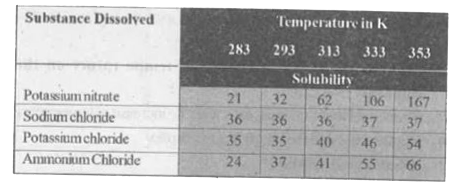Complete Solutions to EXERCISE of chapter IS MATTER AROUND US PURE of Class 9 book with complete answers and questions
| Class 9 | CHEMISTRY |
| Chapter | IS MATTER AROUND US PURE |
| CPC CAMBRIDGE PUBLICATION | EXERCISE |
| Number Of Questions | 11 |
| Academic Year | 2023-24 |
Which seperation techniques will you apply for the Seperation of the oil from water ?
01:25View SolutionWrite the steps you would use to making tea. Use the words solution , Solvents ,Solute, dissolve ,soluble , insoluble , filtrate and residue ?
02:47View SolutionPragya tested the solubility of three different substances at different temperature and collected the data as given below (result are given in the following table, as grams of substance dissolved in 100 gms of water to form a saturated solution.

(a)What mass of potassium nitrate would be needed to produce a saturated solution of potassium nitrate in 50 grams of water at 313 K ?
(b ) Pragya makes a saturated solution of potassium chloride in water at 353 K and leaves the solution to cool at room temperature. What would she observe as the solution cools ? Explain.
(c ) Find the solubility of each salt at 293 K which salt has the highest solubility at this temperature ?
(d ) What is the effect of change of temperature on the solubility of a salt ?View SolutionExplain the following giving examples
(a) Saturated solution
(b) Pure substance
(c) Colloid
(d) Suspension08:45View SolutionClassify each of the Following as a homogenous or Heterogenous mixture ?
Soda , Water, Wood , Air, Soil,Vinegar ,Filtered tea .02:21View SolutionHow would you confirm that a colourless Liquid given to you is pure water?
01:17View SolutionWhich of the following materials fall in the category of a " Pure Substances" ?
(a) Ice
(b) Milk
( c) Iron
(d) hydrochloric acid
( e) Calcium Oxide
( f) Mercury
(g) Bricks
(h) Wood
(i) Air01:48View SolutionIdentify the solutions among the Following mixtures.
(a) Soil
(b) Sea water
(c ) Air
(d) Coal
( e) Soda water?01:14View SolutionWhich of the following will show "Tydall Effect"?
(a) Salt Solution
(b) Milk
( c) Copper Sulphate Solution
(d) Starch Solution ?01:14View SolutionClassify the following into elements, compounds and mixtures
(a) sodium (b) soil, (c ) sugar solution (d) silver (e ) calcium carbonate (f) soap (g) tin (h) silicon (i) coal02:02View SolutionWhich of the following are chemical changes ?
(a) growth of a Plant
(b) Rusting of Iron
( c) Mixing of Iron Filing and sand
(d) Cooking of Food
( e) Digestion of food
( f) Freezing of water
( g) Burning of Candle.02:45View Solution
EXERCISE questions and complete solutions for chapter IS MATTER AROUND US PURE of CAMBRIDGE CHEMISTRY (KANNADA ENGLISH) of Class 9
